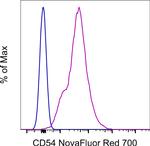Search Thermo Fisher Scientific
Invitrogen
CD54 (ICAM-1) Monoclonal Antibody (YN1/1.7.4), NovaFluor™ Red 700, eBioscience™
FIGURE: 1 / 2
CD54 (ICAM-1) Antibody (M057T03R03-A) in Flow


Product Details
M057T03R03-A
Species Reactivity
Host/Isotype
Class
Type
Clone
Conjugate
Excitation/Emission Max
Form
Concentration
Purification
Storage buffer
Contains
Storage conditions
Product Specific Information
Description: The YN1/1.7.4 monoclonal antibody reacts with mouse CD54 (InterCellular Adhesion Molecule-1, ICAM-1), a 90-110 kDa transmembrane glycoprotein expressed by monocytes, lymphocytes, dendritic cells, and endothelial cells. Expression of CD54 is upregulated on activated lymphocytes. Interaction of CD54 with its ligands CD11a and CD11b is important in the inflammatory response. The YN1/1.7.4 monoclonal antibody recognizes a different epitope than the eBioKAT-1 monclonal antibody.
Applications Reported: The YN1/1.7.4 antibody has been reported for use in flow cytometric analysis.
Applications Tested: The YN1/1.7.4 antibody has been tested by flow cytometric analysis of mouse splenocytes. This can be used at less than or equal to 0.4 µg per test. A test is defined as the amount (µg) of antibody that will stain a cell sample in a final volume of 100 µL. Cell number should be determined empirically but can range from 10^5 to 10^8 cells/test. It is recommended that the antibody be carefully titrated for optimal performance in the assay of interest.
Each product contains 1 vial of NovaFluor conjugate and 1 vial of CellBlox Plus Blocking Buffer .
NovaFluor dyes are not compatible with DNA intercalating viability dyes. Do not use viability dyes such as propidium iodide, 7-actinomycin D (7-AAD) and DAPI. Invitrogen LIVE/DEAD Fixable Dead Cell stains are recommended for use with NovaFluor dyes.
This NovaFluor conjugate has been updated to ship with CellBlox Plus Blocking Buffer (Cat. No. (C001T06F01)). This buffer contains formulation improvements over CellBlox. CellBlox Plus Blocking Buffer is required for optimal staining with NovaFluor conjugates and should be used in all experiments where NovaFluor conjugates are used. Whenever possible, we recommend adding CellBlox Plus Blocking Buffer to antibody cocktails/master mixes prior to combining with cells. Add 5 µL per sample (regardless of the number of NovaFluors in your panel) to use the antibody cocktail as intended. For single-color controls, use 5 µL of CellBlox Blocking Buffer per 100 µL of cell sample containing 10^3 to 10^8 cells.
NovaFluor conjugates are based on Phiton™ technology utilizing novel nucleic acid dye structures that allow for engineered fluorescent signatures with consideration for spillover and spread impacts. Learn more
Excitation: 639 nm; Emission: 700 nm; Laser: 633-640 nm (Red) Laser
Target Information
ICAM-1 (CD54) is an 85-110 kDa single-chain type 1 integral membrane glycoprotein with an extracellular domain of five immunoglobulin superfamily repeats, a transmembrane region and a cytoplasmic domain. ICAM-1 has 7 potential N-linked glycosylation sites and shares considerable amino acid sequence homology with ICAM-3 (CD50) and ICAM-2 (CD102). ICAM-1 binds to integrins of type CD11a/CD18 (leukocyte adhesion molecule, LFA-1), or CD11b/CD18 (Mac-1) and is exploited by Rhinovirus as a receptor. ICAM-1 is expressed by activated endothelial cells and detected on epithelial cells, fibroblasts, chondrocytes, B lymphocytes, T lymphocytes (low), monocytes, macrophages, dendritic cells and neutrophils, with lower levels that increase upon inflammation. ICAM-1 is also detected in some carcinoma and melanoma cells. Soluble ICAM-1 is detectable in the plasma and is elevated in patients with various inflammatory syndromes.
For Research Use Only. Not for use in diagnostic procedures. Not for resale without express authorization.
How to use the Panel Builder
Watch the video to learn how to use the Invitrogen Flow Cytometry Panel Builder to build your next flow cytometry panel in 5 easy steps.
References (0)
Bioinformatics
Protein Aliases: CD54; Human rhinovirus receptor; ICAM-1; Intercellular adhesion molecule 1; Ly 47; MALA-2; MALA2; MyD10; sCD54; soluble CD54; Surface antigen of activated B cells
Gene Aliases: CD54; Icam-1; Icam1; Ly-47; MALA-2
UniProt ID: (Mouse) P13597
Entrez Gene ID: (Mouse) 15894

Performance Guarantee
If an Invitrogen™ antibody doesn't perform as described on our website or datasheet,we'll replace the product at no cost to you, or provide you with a credit for a future purchase.*
Learn more
We're here to help
Get expert recommendations for common problems or connect directly with an on staff expert for technical assistance related to applications, equipment and general product use.
Contact tech support

